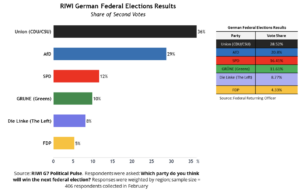Last Sunday (23 February 2025), millions of Germans cast their votes in the Federal Elections. The official results revealed a sharp increase in support for conservative and far-right parties. The mainstream conservative Christian Democratic Union (CDU), along with its partner, the Christian Social Union (CSU), secured first place with 28.6 percent of the vote. The far-right, anti-immigrant Alternative for Germany (AfD) surged into second place with 20.8 percent. The Social Democratic Party (SPD), to which current Chancellor Olaf Scholz belongs, came in third with just 16.4 percent—a nearly 10-point drop from their first-place finish in 2021.
Since 2022, RIWI has been tracking political sentiment across G7 countries through its G7 Political Pulse Index. This monthly tracker measures various indicators of political stability, including polarization, government approval, and confidence in elections. The Index uniquely draws from broad-based, anonymous opinion, reducing the biases typically associated with conventional polling. The questions are designed to gauge whether polarization is worsening or remaining stable over time.
Although a shock to most observers, at RIWI, we were not entirely surprised by the results of the German election. RIWI, which stands for ‘Real-Time Interactive World-Wide Intelligence, was founded on a core principle: every voice counts. We believe that gathering the broadest set of true opinions from the widest range of locations leads to the most accurate predictions.

Since August 2024, the G7 Political Pulse Index showed that CDU/CSU and AfD were consistently the most favored parties. More specifically, AfD saw significant support gains starting in November 2024. Data collected in February 2025 provided an accurate picture of how the parties would perform on Election Day. Additionally, trends indicated that immigration and political correctness were the key topics fueling political division, according to RIWI respondents. This could help explain the rising popularity of AfD.
RIWI will continue tracking political sentiment in G7 countries. The new configuration of the third largest economy in the world has several implications domestically and internationally. While the CSU/CDU declared that they would refuse to form a coalition with AfD, the rising popularity of the far-right party is shifting Germany’s traditionally centrist political landscape and may exacerbate social tensions. Furthermore, the AfD’s strong Euroskeptic stance could increase political pressure on Germany’s relationship with the European Union, and fuel nationalist and protectionist movements across Europe. The implications may be far-reaching: from increasing political polarization in Germany to potentially undermining European unity, challenging global trade, and impacting social cohesion within Germany.
Curious to learn more about emerging political trends? Contact us to discover how RIWI’s unique data collection methodology provides accurate, unbiased insights into public opinion worldwide.
